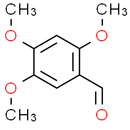Description
Asarylaldehyde is a natural COX-2 inhibitor, which isolated from carrot (Daucus carota L.) seeds significantly inhibits cyclooxygenase II (COX-2) activity at IC50 value 100 μg/mL.
Product information
CAS Number: 4460-86-0
Molecular Weight: 196.20
Formula: C10H12O4
Synonym:
Asaronaldehyde
2, 4, 5-trimethoxy-Benzaldehyde
Chemical Name: 2, 4, 5-trimethoxybenzaldehyde
Smiles: COC1=CC(C=O)=C(C=C1OC)OC
InChiKey: IAJBQAYHSQIQRE-UHFFFAOYSA-N
InChi: InChI=1S/C10H12O4/c1-12-8-5-10(14-3)9(13-2)4-7(8)6-11/h4-6H,1-3H3
Technical Data
Appearance: Solid Power
Purity: ≥98% (or refer to the Certificate of Analysis)
Solubility: DMSO: 39 mg/mL(198.77 mM). Water: Insoluble.
Shipping Condition: Shipped under ambient temperature as non-hazardous chemical or refer to Certificate of Analysis
Storage Condition: Dry, dark and -20 oC for 1 year or refer to the Certificate of Analysis.
Shelf Life: ≥12 months if stored properly.
Stock Solution Storage: 0 - 4 oC for 1 month or refer to the Certificate of Analysis.
Drug Formulation: To be determined
HS Tariff Code: 382200
How to use
In Vitro:
Asaraldehyde is found to be the most abundant constituent, but is totally absent in its cultured broth and its natural host, C. kanehirae wood. On feeding with the acid-digested sawdust of C. kanehirae wood or vanillin to the broth for culture, Asaraldehyde is produced in both cultured broths. Asaraldehyde shows 3.32% of prostaglandin H endoperoxide synthase-1 (COX-1) inhibitory activity and 52.69% prostaglandin H endoperoxide synthase-2 (COX-2) inhibitory activity, respectively at 100 mg/mL. Asaraldehyde shows selectivity towards COX-2 enzyme inhibition at 100 µg/mL. The COX-2/COX-1 ratio for Asaraldehyde is 17.68 at 100 µg/mL compared to solvent control. Asaraldehyde down-regulates C/EBPβ, C/EBPδ, and C/EBPα. Asaraldehyde suppresses expression of PPARγ1 and PPARγ2. Asaraldehyde also significantly suppresses the expression of acetyl-CoA carboxylase (ACC).
References:
- Wu MR, et al. J Agric Food Chem, 2012, 60(29), 7262-7269.
- Momin RA et al. Phytother Res, 2003, 17(8), 976-979.
- Chen CC et al. Lett Appl Microbiol, 2007, 44(4), 387-392.
Products are for research use only. Not for human use.
Payment & Security
Your payment information is processed securely. We do not store credit card details nor have access to your credit card information.


